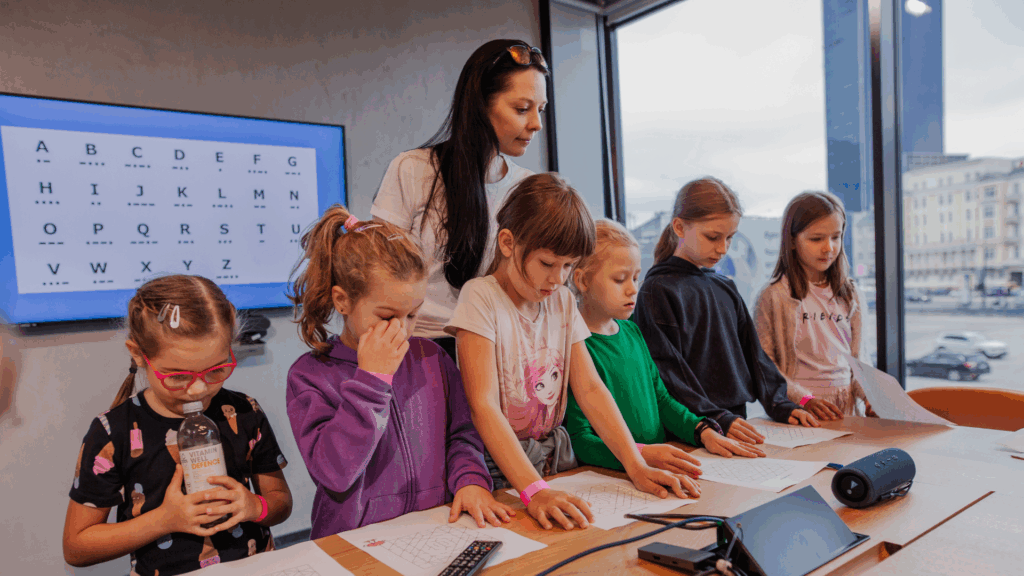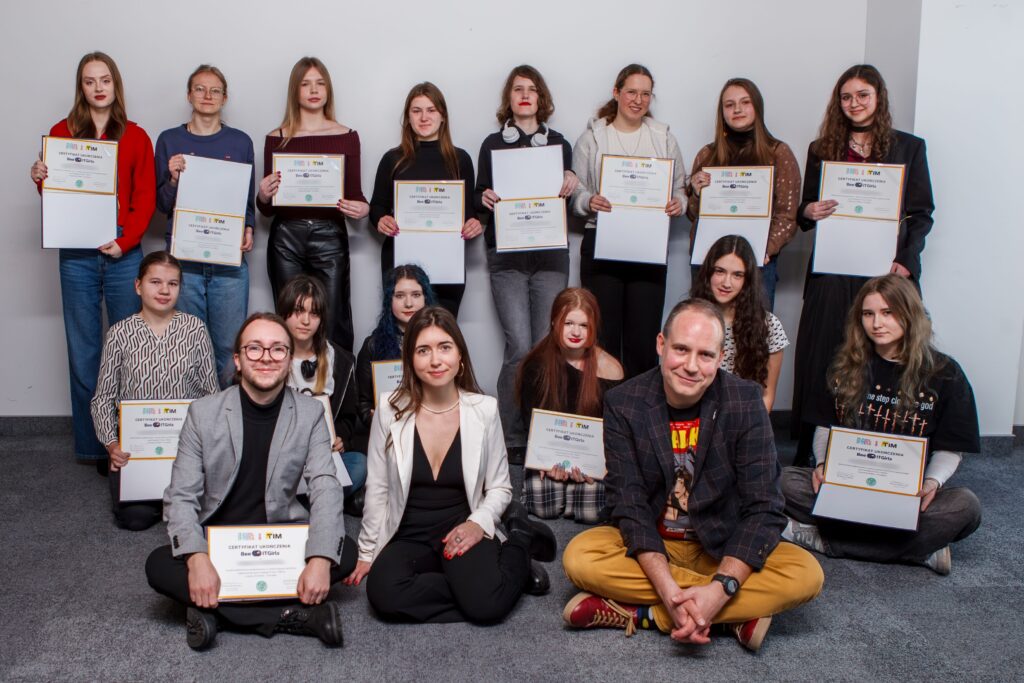
Youth and Artificial Intelligence – Main Report Conclusions
Youth in Poland demonstrate a high level of familiarity with artificial intelligence. The survey results show that 100% respondents know the term "AI" and as many as 72% young Poles declare that they understand well what this technology is. What's more, two thirds of the respondents (63%) actively use AI-based tools, making it an integral part of their daily lives. The popularity of applications such as ChatGPT, Gemini and Bing confirm that AI is becoming increasingly widely used in the lives of young people.
One of the most important areas where artificial intelligence has found application is education. As many as 67% young people use AI to support their learning, including solving difficult problems, organizing work, or generating ideas for projects. More than half of respondents (56%) use AI tools to help with learning, and 50% indicates its role in learning foreign languages. These conclusions confirm that AI supports the development of young people's skills and competences.


Awareness of risks and responsible use
Despite its growing popularity and wide application, young people also recognize the potential risks associated with AI. More than 65% students are aware of the risk of AI tools using personal data, and 57% are concerned that AI may have a negative impact on their education. These results highlight the need for data protection education and the development of critical thinking among young people so that they can make informed use of new technologies.
At the same time, young people expect a responsible approach to the development and application of AI. 53% respondents were in favor of introducing regulations, that would require companies that build AI models to disclose the data used to train them. This need for greater transparency and ethics in AI is an important signal to policymakers and technology companies.
A surprising conclusion from the study is the relatively low level of involvement of parents and teachers in education about AI. As many as 63% students declare that they do not expect teachers to help them use AI tools, which may indicate a lack of competence or awareness in this area. In turn, those students who seek support most often indicate the need to assess the truthfulness of generated content and understand the potential risks associated with AI.


Collaborating for the future of technology
The IT Girls Foundation, co-author of the report, has been working for years to equalize opportunities in access to technology and promote responsible use of modern tools. - The IT Girls Foundation was established to support equal opportunities in access to technological education and promote responsible use of innovation. The report "Generation AI. How young people use artificial intelligence” shows that young people in Poland use AI consciously and effectively – as many as 67% students use it in their studies, and 50% in writing papers, which confirms the enormous potential of this technology – says Wioletta Klimczak, co-founder and president of the board of the IT Girls Foundation at the IT Girls Foundation. – However, the conclusions of the study are also an alarm signal. The too low level of involvement of teachers and parents in education about AI requires an immediate response. We must ensure that young people not only know the tools, but are also able to critically analyze their operation and possible effects, especially in the context of ethics and data protection.
Report "Generation AI: How Young People Use Artificial Intelligence" provides valuable information on how young people perceive and use AI. One of the key findings is that most respondents are familiar with the term artificial intelligence, and 2/3 of them admit that they use AI-based tools. – emphasizes Liwia Kwiecień, Member of the Board for HR at Nationale-Nederlanden. – This proves that young people are aware of the impact of artificial intelligence on their daily lives, and the development of competences in this field is not only the future, but above all a need. AI is playing an increasingly important role in our lives, changing the way we work, learn and do business. That is why Nationale-Nederlanden is not only involved in educating young people, but also invests in training and development of its employees in the field of new technologies and AI.
Next Step: AI Education Program
The aim of the campaign conducted by National Dutch and the IT Girls Foundation is to educate young people about the responsible use of technology and to build social awareness of artificial intelligence. This initiative aims to support young people in better understanding the potential of AI and the ethical and social challenges associated with it. The partnership will also create an online educational program in the space Campus AI, during which young people will learn both the theoretical foundations of using AI and the practical applications of AI-based tools.
The report "Generation AI. How young people use artificial intelligence" is based on a study conducted in November 2024 Ariadna National Research Panel. The survey was conducted among 1,058 respondents aged 16–20, representing students of secondary and post-secondary schools from various locations in Poland. Data was collected using the CAWI (Computer-Assisted Web Interview) method, and the sample was selected based on demographic criteria such as gender, age, and size of place of residence. The results of the study provide a solid basis for analyzing trends related to youth and AI in Poland.
The report can be downloaded from the IT Girls Foundation website at https://itgirls.org.pl/raport-pokolenie-ai/. We invite you to read the research results and join the discussion on the role of AI in education and development of young generations.
You might be interested

- Dane sondażowe wskazują na rosnące poparcie dla systemowego ograniczenia dostępu do platform społecznościowych dla osób poniżej 16. roku życia. Zjawisko to, napędzane obawami o zdrowie psychiczne młodzieży, wymaga jednak głębszej analizy niż tylko w kategoriach „zakazać czy pozwolić”. Analizujemy obecne trendy legislacyjne w Europie i na świecie oraz zastanawiamy się, jaką rolę w procesie zmian powinna odgrywać edukacja technologiczna i budowanie alternatyw dla świata wirtualnego.

- 11 lutego 2026 świętujemy Międzynarodowy Dzień Dziewcząt i Kobiet w Nauce. To doskonały moment, by zastanowić się, jak my – rodzice, opiekunowie i nauczyciele – możemy wspierać młode talenty w świecie, który wciąż bywa pełen stereotypów.

- Z dumą ogłaszamy zakończenie kolejnej odsłony naszego bezpłatnego kursu programowania dla dziewcząt w wieku 14-19 lat.
Join our community!
What will you find in our newsletter?
- Information about the latest actions
- New product data
- Details about the workshops
- Offer validity dates
KRS: 0000921737
NIP: 1182228955
REGON: 38998779500000
Website created by Digital Competence Foundation

 Return to blog
Return to blog